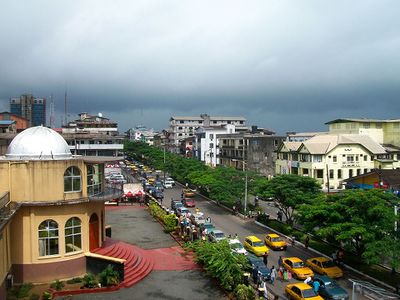Gynopedia needs your support! Please consider contributing content, translating a page, or making a donation today. With your support, we can sustain and expand the website. Gynopedia has no corporate sponsors or advertisers. Your support is crucial and deeply appreciated.
Monrovia
OVERVIEW
Contraception (Birth Control)
General Note: There are many types of contraceptives, also known as "birth control," including IUDs, oral contraceptives, patches, shots, and condoms, etc. If you would like to view a full list, click here.
Laws & Social Stigmas
In Liberia, you can purchase condoms and birth control pills at pharmacies without a prescription. While you may technically need a prescription for birth control pills, this is not typically enforced, and birth control pills are available over-the-counter.[1] [2] However, for other forms of contraception, such as implants, injectables, and IUDs, you may need to directly visit a hospital or clinic to obtain them.
What to Get & Where to Get It
Costs
Emergency Contraception (Morning After Pill)
Important Notes: Emergency contraception may prevent pregnancy for three days (72 hours) and sometimes five days (120 hours) after unprotected sex. Take EC as soon as possible after unprotected sex to prevent pregnancy. If you don't have access to dedicated EC, oral contraceptives can be used as replacement EC, but remember the following: 1) Only some contraceptives work as EC 2) Different contraceptives require different dosages and time schedules to work as EC 3) You must only use the first 21 pills in 28-day packs and 4) They may be less effective than dedicated EC. For general information on emergency contraceptives, click here and here.
Laws & Social Stigmas
In Liberia, you can obtain emergency contraceptive pills (morning after pills), but they may be only available at family planning clinics in some cases.[3] We still need to collect more information on this subject (update this page if you know more). In 2017, it was estimated that about 13% of Liberian women (of reproductive age) had knowledge of emergency contraceptive options, and 3% of Liberian women (of reproductive age) had ever used emergency contraceptive pills have ever used emergency contraceptive pills.
What to Get & Where to Get It
- You can obtain emergency contraceptive pills (morning after pills), but they may be only available at family planning clinics in some cases. One brand you may find at family planning clinics is Optinor[4]
- There may be stock-outs of emergency contraception at times. In 2013, there were reported stock-outs of such pills.[5]
- Note: The longest-lasting EC is currently ellaOne. It lasts up to 5 days (120 hours) after unprotected sex. Check to see if your country carries ellaOne. If your country doesn't carry ellaOne, copper IUDs may also prevent pregnancy up to 5 days after unprotected sex. If none of these options are available, and it's been over 3 days since you had unprotected sex, you can still take EC, which may work up to 5 days. Note that EC pills are not 100% effective and should be taken as soon as possible.
Costs
Sexually Transmitted Infections (STIs/STDs)
Important Notes - Learn about PEP and PrEP: If you think that you've been recently exposed to HIV (i.e. within 72 hours), seek out PEP (Post-Exposure Prophylaxis). It's a month-long treatment to prevent HIV infection after exposure, and it may be available in your city. Take PEP as soon as possible. For more information, click here. If you are at risk of HIV exposure, seek out PrEP (Pre-Exposure Prophylaxis). It's a daily oral pill that can prevent HIV infection before exposure. To learn more about PrEP, click here.
Laws & Social Stigmas
In Liberia, there are no known travel or residency restrictions for people with HIV/AIDS. This means that you can enter the country, regardless of your HIV status, and you should not be deported if you test positive for HIV while you are in the country.
Testing Facilities
Support
Costs
Medications & Vaccines
Laws & Social Stigmas
What to Get & Where to Get It
Costs
Menstruation
Note: In addition to pads and tampons, you can also use menstrual cups and menstrual underwear for your period. To learn more about menstrual cups, click here. To learn more about menstrual underwear, click here.
Laws & Social Stigmas
What to Get & Where to Get It
Costs
Gynecological Exams
Laws & Social Stigmas
What to Get & Where to Get It
Costs
Pregnancy
Laws & Social Stigmas
The maternal mortality rate (MMR) is 725 deaths per 100,000 live births, according to 2015 data. This MMR is ranked seventh in the world, and is roughly comparable to Somalia. [6]
What to Get & Where to Get It
Costs
Abortion
Important Note: There are two main types of abortions: medical (also known as the "abortion pill") and surgical (also known as "in-clinic"). For medical abortions, you take a pill to induce abortion. For surgical abortions, a procedure is performed to induce abortion. For general information about medical and surgical abortions, click here.
Laws & Social Stigmas
What to Get & Where to Get It
Costs
Advocacy & Counseling
Laws & Social Stigmas
What to Get & Where to Get It
Costs
List of Additional Resources
- Ministry of Health - Republic of Liberia
- The Family Planning Association of Liberia (FPAL): "The Family Planning Association of Liberia (FPAL) is Africa’s longest established family planning organization. It provides family planning; information, education and communication around SRH; and services related to the prevention and management of HIV and AIDS including voluntary counselling and testing (VCT). FPAL operates 92 service points, including 8 static clinics and 2 youth centres. It has a permanent staff of 26, and fieldwork is carried out by 42 community-based distributors (CBDs) and 134 peer educators."
- Equaldex - Liberia: Click here to learn about LGBTQ rights and laws in Liberia. It is important to understand that homosexuality is illegal in Liberia
